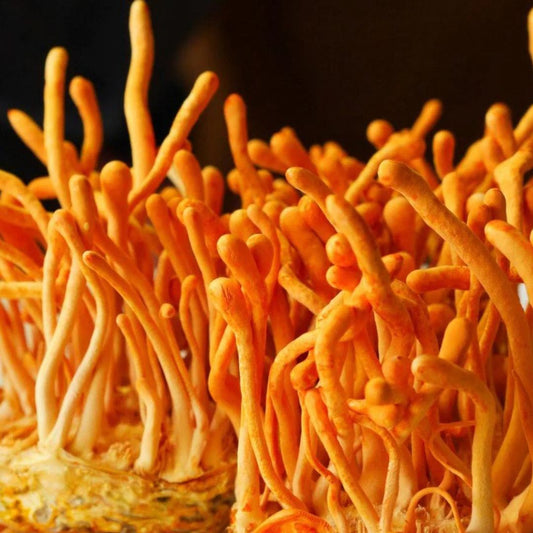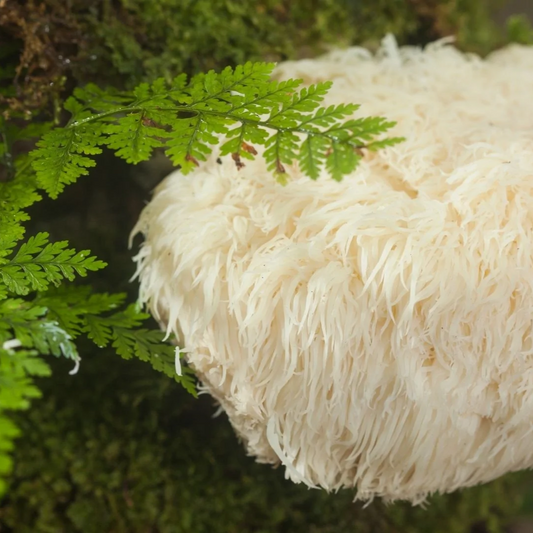Nature has the ability to surprise us with its extraordinary creations, and the white, shaggy ‘Lion’s mane’ mushroom certainly showcases this. The peculiar, coral-like fungus has not only captivated scientists, mycologists and mushroom enthusiasts, but also an increasing number of health and wellness fanatics, thanks to its remarkable forms and potential health benefits. Yes, this potent nootropic is believed to offer nerve support and repair, mental clarity, enhanced cognition and memory, and blood sugar regulation, amongst other astonishing healthful advantages. So, you can see why Lion’s mane mushroom is a growing popular choice of supplementation, certainly for those seeking clarity and focus in a frantic world (and perhaps you’re keen to give it a try yourself). In this article, we'll take a closer look at this health-enhancing functional mushroom and uncover the secrets behind its fascinating characteristics.
An Introduction to Lion’s Mane: The Mushroom Marvel
The cascading tendrils and bushy appearance of Lion’s mane mushroom (Hericium erinaceus) make it one of the most distinctive fungi in the natural world. The noticeable striking resemblance to a majestic creature is where it gets its charming name; other names for Lion’s mane include ‘Bearded Tooth’, ‘Bear’s Head’, ‘Monkey’s Head’ and ‘Yamabushiitake’. Today, the fungus is increasingly referred to as the “Smart Mushroom’, the ‘Memory Mushroom’ or the ‘Mushroom for the Mind’; a testament to its growing reputation as a cognitive enhancer and brain-boosting agent.
|
Species |
Scientific Name |
Other Names |
Habitat |
Other Facts |
|
Lion’s Mane Mushroom |
Hericium erinaceus |
Bearded tooth, Monkey’s head, Hou tou gu, Yamabushiitake |
Grows on rotten or dying hardwood, especially maple, oak, and beech. Predominantly found in North America, Europe and Asia. A relatively rare find in the UK. |
A revered culinary and medicinal mushroom with health-promoting properties, including anxiety and stress relief, immune support and neuroprotection.
|
History
Lion’s mane has an absolutely fascinating history that spans centuries. Its usage can be traced back to traditional Chinese medicine, where it earned the name ‘Yamabushiitake’. Ancient Chinese healers highly regarded this curious fungus for its potential medicinal properties. It was (and continues to be) recommended for strengthening the internal organs, improving digestion, gastritis and stomach ulcers, and for overall strength and vigour. Lion’s mane has typically been used in China and other countries as a powder added to food, smoothies, tea or taken as capsules.
Habitat and Cultivation
Lion's mane is predominantly found in North America, Europe and Asia. It grows on hardwood trees, particularly oak, beech and maple, forming large colonies or solitary clusters. However, due to its rising popularity, it is now being cultivated indoors on a commercial scale. Does Lion's mane grow in the UK? This mushroom does grow int he UK but is now quite rare. As a result, it is classified as an endangered species, which means if found in the wild, it should not be picked.
Culinary Delight
Beyond its captivating appearance, Lion's mane mushroom also holds culinary allure. Its delicate flavour, meaty texture and versatility make it a sought-after ingredient, particularly in soups, stir-fries, and vegetarian dishes (cooked Lion’s mane makes a fantastic substitute for seafood or meat. Not convinced? Try it for yourself!).
The Health Benefits of Lion’s Mane Mushroom
Over time, the scientific community became increasingly intrigued by the benefits of Lion’s mane. Researchers began studying its chemical composition and potential therapeutic effects. They discovered that it contains bioactive compounds, such as erinacines and hericenones, which exhibit neuroprotective and nerve-regenerating properties.
The growing body of scientific evidence surrounding Lion's mane mushroom has fuelled its recognition as a natural nootropic and neuroprotective agent. It has garnered attention for its potential in supporting brain health, improving cognitive function, and possibly even aiding in the management of neurodegenerative conditions. Lion’s mane is now one of the most widely regarded beneficial fungus species across the globe.
10 Potential Benefits of Lion’s Mane
Below is an overview of the potential benefits of Lion’s mane.
1. Cognitive/Memory Enhancement
Is Lion’s mane good for memory and focus? Improvement of cognitive function has been shown in some in vivo research and clinical trials. The mushroom contains compounds that can stimulate the production of nerve growth factor (NGF), a protein crucial for brain cell growth and maintenance. This may contribute to improved memory, an increased ability to focus and greater mental clarity. While further studies are required, the impressive brain-boosting benefits of Lion’s mane have prompted studies into its impact on dementia symptoms, and the fungus shows promise in protecting against Alzheimer’s disease.
2. Nervous System Support and Repair
The aforementioned diterpenes (erinacines and hericenones), found in the mycelium and the fruiting body of the mushroom respectively, are currently being researched for their effects on stimulating nerve growth and potentially helping to grow and repair nerve tissue. Lion’s mane is a promising natural remedy for some neurological conditions and may help the body recover from nervous system injuries more quickly.
3. Better Digestive Health
Can Lion’s mane improve digestion? Traditionally, Lion's mane mushroom has been used in medicine to support digestive health. Recent research has shown that it may help protect the stomach lining and reduce inflammation, potentially counteracting gastritis and benefiting individuals with gastrointestinal disorders and stomach ulcers.
4. Immune System Support
Lion’s mane mushroom’s various bioactive compounds have been found to enhance immune system activity. By strengthening the body's natural defence mechanisms thanks to potent antioxidant properties, it may help ward off infections and promote overall wellbeing.
5. Blood Sugar Regulation
Research suggests that Lion's mane may contribute to blood sugar regulation (and potentially help with diabetes control) through various mechanisms. Firstly, it has been observed to increase insulin sensitivity, which means the body becomes more responsive to the effects of insulin. Improved insulin sensitivity helps glucose enter cells more efficiently, reducing blood sugar levels. Additionally, the mushroom may promote the regeneration and protection of pancreatic beta cells, responsible for producing insulin.
6. Relieved Stress, Anxiety and Depression
Long considered a mood regulator, Lion’s mane has been used for centuries to help treat mental health issues including depression and anxiety. The mushroom is believed to have a calming influence on the central nervous system and provide relief from low mood.
7. Improved Heart Health
High cholesterol levels are a major factor in heart disease. Lion’s mane, when consumed regularly, has the potential to lower cholesterol. It improves fat metabolism and lowers levels of triglycerides, potentially reducing the risk of cardiovascular disease and health problems linked to obesity. More human studies are required for conclusive results in this area.
8. Enhanced Muscle Recovery
Lion’s mane mushroom may be a great choice of supplement post-workout. The fungus boasts powerful anti-inflammatory properties, therefore reducing inflammation when muscles are fatigued from intense training, potentially reducing muscle recovery time and energising you more quickly in time for your next fitness session.
9. Anticarcinogenic Properties
Human trials are in their very early stages. However, Lion’s mane has shown some promise in its anti-cancer abilities, killing cancer cells at speed when mixed with them within a test tube. The mushroom may also slow the spread of cancer cells. It’s important to note, however, that much more research is required into the anticarcinogenic properties of Lion’s mane for conclusive results.
10. Reduced Oxidative Stress
Prolonged oxidative stress and inflammation are the key drivers of many modern diseases and disorders. The potent anti-inflammatory and antioxidant active compounds in Lion’s mane may help reduce inflammation and oxidative stress, therefore reducing the severity of these illnesses and promoting overall good health.
What Does the Science Say?
Scientists have discovered 35 bioactive compounds in the cell wall of Lion’s mane; many of these are unique beta-glucans ( a type of polysaccharide) with neuroprotective and regenerative properties as well as antioxidation, anti-tumour, anti-gastric ulcer properties, etc.
There are a myriad of studies on lion’s mane, including human clinical trials, which remain ongoing. In one study, 30 volunteers with mild cognitive impairment took Lion’s mane powder daily for 16 weeks, with a marked increase in cognitive functioning occurring compared with those taking a placebo.
A study in China saw chronic gastric ulcer patients take either Lion’s mane supplements or conventional medical treatment. The patients taking Lion’s mane extract experienced improved levels of inflammation, stomach lining repair and improved quality of life – even more so than those taking the standard treatment.
Studies on Lion’s mane's influence on human health are ongoing, and more human-based clinical trials are necessary to understand the full extent of the benefits of this impressive mushroom.
Is Lion’s Mane Legal?
Yes, Lion's Mane Mushroom is legal in the UK (and in most countries) and is widely available as a dietary supplement or culinary ingredient. It is considered a natural food source rather than a controlled substance. However, it's important to check the specific regulations in your country or region to ensure compliance with local laws regarding the sale and use of Lion's mane mushrooms.
Lion's Mane Uses: Recipes and Supplements
The fruiting body of Lion’s mane mushroom is delicious and healthful; try slicing and sautéing until tender, baking or adding to a number of dishes including soups. Supplements are a great way of reaping all the benefits of Lion’s mane mushroom in a concentrated form. Lion’s mane tinctures of the dried fruiting body can be purchased (or made). Extract powders are another form of Lion’s mane (available as powders or capsules) which can be easily added to your daily wellbeing routine; simply swallow the mushroom extract capsules daily with water or sprinkle the powder into your coffee or over your food.
Shop Now - Lion's Mane Mushroom Capsules
Potential Side Effects and Risks
Lion’s mane is generally extremely well tolerated across the globe and appears safe to consume. Of course, Lion’s mane should be avoided by people with mushroom allergies. Rare side effects can include:
- Stomach upset
- Nausea
- Diarrhoea
- Digestion issues
- Skin rashes
Taking Lion’s mane in large quantities may result in some interaction with medications, therefore you should consult with your GP before adding Lion’s mane to your routine if you are currently using prescription medication.
Final Word
Lion's mane mushroom is undoubtedly a captivating marvel of nature, both in appearance and in the potential benefits it offers. Whether enjoyed as a delicious ingredient in culinary creations or explored for its therapeutic properties, this unique fungus continues to surprise and fascinate us. As research progresses, we may uncover even more reasons to celebrate the furry wonder that is Lion's mane. So, why not give this extraordinary mushroom a try and experience its magic for yourself? Check out our bestselling, high-strength Lion’s Mane Mushroom Capsules.










